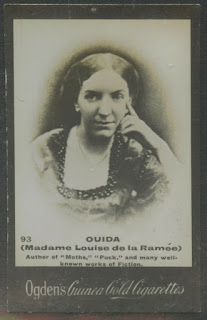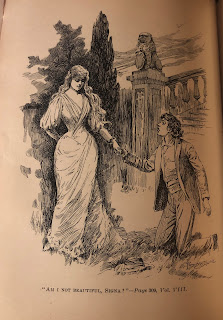By Craig: I read a lot of books. Most of the books I read are from authors long dead. Authors mouldering in their graves for decades or even centuries. Their voices muted but not wholly extinguished. One of these authors of yore was a prolific writer in the late 19th century. Maria Louise Ramé AKA 'Ouida' as she preferred to be called, was the author of numerous novels and short stories. I was familiar with a few of her stories. When I was a young boy, I read A Dog of Flanders. I had almost forgotten about her and indeed it had been many years since the name 'Ouida' had even crossed my mind. It came back to me when I came across her once again while reading about one of my favorite writers, Jack London. I have read a good portion of London's work and read that one of the reasons he decided to become a writer was after reading Ouida's book Signa. I had never heard of this book, but since London thought it was such a great novel, I decided to give it a try. I was not disappointed!
Signa was published in 1875 while Ouida was living in Italy. It tells the tale of a young genius named Signa who listens to the sounds of nature and sings at the country church. Signa plays the lute and has a melodious voice. Though he is a peasant, he is unlike the other young people in the town. He cares nothing about toiling the land. He would rather sing with the birds and dream of the music that forms in his head. He lives with his opportunistic uncle, Lippo and his wicked aunt Nita who thrash and abuse him on a daily basis. Signa seems to accept his lot in life until one day he sees a violin in a shop window and becomes obsessed in obtaining it.
Signa's origins are unknown to him. At a year old, he is found by his uncle's Bruno and Lippo during a flood next to his dead mother, Pippa who had tragically fell to her death off a cliff. Lippo, of course, is married and has a brood of children while his older brother, Bruno lives alone on a hillside farm, sulking in misery, years after the death of the woman he once loved. Most of Signa's life is harsh and brutal except for the time he spends with his uncle Bruno who makes it his life's quest to do right by the boy. Bruno is a solitary man who spends his days working the farm and doting on the boy who becomes a sort of obsession to him. Bruno lives for Signa, but Signa lives for his music.
Signa is also friends with Palma and Gemma, two sisters who live in the village. Palma is a plain hardworking girl and who secretly loves Signa, but the boy's affections are directed at the selfish and beautiful Gemma who makes him do things (like stealing) that are otherwise foreign to his character. One day, Bruno takes Signa to the city where a painter hears the boy sing and paints his picture, telling him that one day he will be famous. He gives Signa the money that he needs to buy the violin that he has longed to possess. However, when Lippo and Nita find out that he has spent the money on what they consider a toy, they are furious. Nita attempts to beat Signa but the boy finally fights back and injures Nita who swears revenge. Signa knows that if Bruno finds out that Lippo and Nita have been beating him that Bruno will kill his brother. In order to protect Bruno, Signa runs away, taking the opportunistic Gemma with him. Bruno finds out that Signa has gone and is devastated. He goes after them and eventually finds them about to embark on an ocean voyage under the insidious enticement of a scoundrel that uses children for his own monetary benefit. Signa willingly returns with Bruno as long as he promises to not hurt Lippo. Bruno then shelters the boy from his brother and as the years roll on Signa becomes restless. After an argument with Bruno, the man destroys his beloved violin in an act of rage. Bruno almost immediately regrets what he did and makes up for it by sending the boy to study music in the city. Eventually, Signa becomes famous for his operas. His travels back to Bruno and the farm become less frequent. The ending is a classic tragedy in the vein of a Shakespeare play.
The novel is written in a stylish prose that was common for the time but this in no way takes away from the story. In fact, it is the descriptive scenes of peasant life and nature that add to the novel's mystique. The character development in this book is beyond exceptional, especially Bruno who carries the novel and is one of the great personas of literature. I thoroughly enjoyed reading this story and rank it as one of the best books that I have ever read. It ranks up there in my estimation with Thomas Hardy's The Mayor of Casterbridge and Daphne Du Maurier's Jamaica Inn as one of my favorite novels. It is hard to believe that this timeless book is almost forgotten today. In fact, there are very few reviews of Signa that I can find online. If you get a chance give it a try.
Ouida



